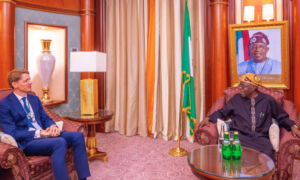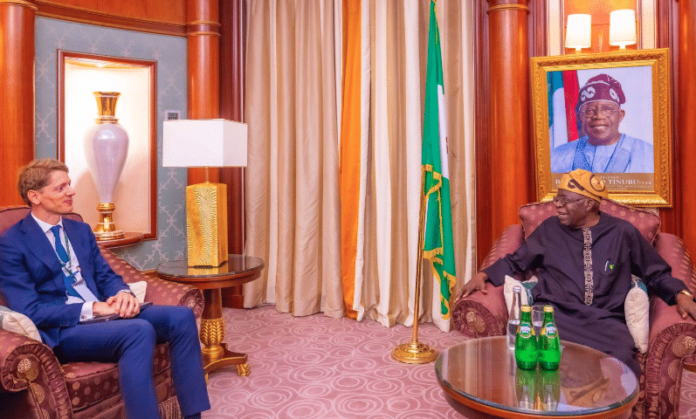The recent claims made by the Nigerian presidency regarding a supposed lack of comment from Danish shipping and logistics company, A.P Moller-Maersk, on a $600 million investment in Nigeria’s seaport infrastructure have sparked widespread interest and scrutiny. This assertion raises questions about the intricacies of foreign investments in critical infrastructure projects and the transparency surrounding such agreements.
 It was disclosed that A.P Moller-Maersk chairman, Robert Maersk Uggla, had discussed the investment with President Tinubu on the sidelines of a meeting discussing energy development and growth.
It was disclosed that A.P Moller-Maersk chairman, Robert Maersk Uggla, had discussed the investment with President Tinubu on the sidelines of a meeting discussing energy development and growth.
The direct quote attributed to Uggla, “We believe in Nigeria, and we will invest $600 million in existing facilities and make the ports accommodating for bigger ships,” encapsulates the company’s commitment to fostering sustainable progress and driving positive impact through its investments. This strategic announcement not only showcases Uggla’s confidence in Nigeria’s market potential but also highlights the company’s dedication to fostering mutually beneficial partnerships with the local community and government.
However, Maersk officials, in a statement to Lloyds List, one of the world’s oldest continuously running journals, refuted the existence of a signed deal, emphasizing that while discussions with the Nigerian government were ongoing, no concrete investment plans had been established.
In response to the claim that a deal exists involving Maersk, the company has vehemently denied such assertions, stating that the purported deal is news to its officials. Maersk’s denial underscores the importance of accurate reporting and fact-checking in today’s interconnected world. This incident serves as a reminder of the potential repercussions of misinformation in the business world, emphasizing the need for diligence and integrity in the dissemination of news. As a leading global shipping company, Maersk’s reputation and credibility are paramount, making it imperative for accurate information to be disseminated regarding any purported agreements involving the company. Misunderstandings and false claims can have far-reaching implications not only for the companies involved but also for investors, stakeholders, and the wider public. It is essential for media outlets and individuals to exercise caution and verify information with reliable sources before reporting on potentially sensitive matters involving prominent entities like Maersk. Ultimately, transparency, accuracy, and ethical journalism are essential in maintaining trust and credibility in the business community.
While reacting to several media reports that Maersk denied such a million-dollar investment in Nigeria, Tinubu’s Special Assistant on Social Media, Dada Olusegun, posted via his X handle on Tuesday that the company hasn’t denied the FG’s statements.
Olusegun wrote, “The media’s headline choice sparked controversy, not Maersk’s. Maersk hasn’t contradicted or denied the Federal Government of Nigeria’s statements.”




